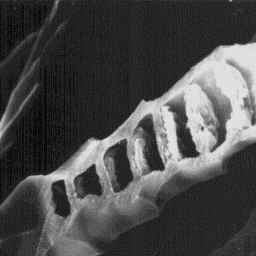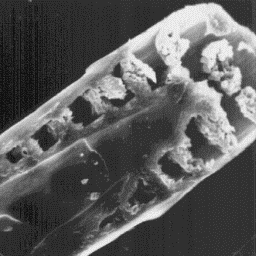 Mus musculus
Mus musculus
------------
English: House mouse
German: Hausmause
French: Souris domestique
Spanish: Raton
Distribution areas
------------------
The house mouse is on of four species of
the genus mus, which originates in Central
Europe, from where it spread with the man
into other parts of the world. A number of
species of mouse are found in all
continents. These differ in body size and
shape. The cuticular structure
of the fine fibres, 2000x
Description of the fur
----------------------
The skins are about 7 to 10 cm long; the tail is up to 9 cm long. The coat
is brown-grey in colour, the belly part and the inside of the legs are
light-grey or white in colour. The undercoat is dark grey in colour, only on
the belly is it white. The thickness of the coat is up to 6 mm.
|
|
 Mus musculus
Mus musculus
------------
English: House mouse
German: Hausmause
French: Souris domestique
Spanish: Raton
Structure of the hair
---------------------
The microscopic structure of the skin
surface is furrowed and the hair follicles
are narrow with raised edges. On average,
the follicles contain two hair shafts.
The fine fur fibres are circular or
elliptical in cross-section with a diameter The cuticular structure
of 7 to 15 µm. The cuticular scales are of the fine fibres, 1000x
cornet-like in the bottom part, and flat
edge-shaped type in the other parts of the shafts. The scale surface is
smooth and the scale margins are straight. The medulla is wide, unbroken and
central symmetrical-shaped. The overall structure of the medulla is of the
uniserial ladder type with an amorphous or granular detailed structure to the
infilling substance.
|
|
 Mus musculus
Mus musculus
------------
English: House mouse
German: Hausmause
French: Souris domestique
Spanish: Raton
The intermediate fibres have a diameter
of 8 to 18 µm. The cross-section is
elliptical in outline. The cuticular scales
are flat edge-shaped with smooth surface
and straight scale margins. The medulla is
wide, unbroken and central
symmetrical-shaped in the cross-section.
This medullary column is of the uniserial
ladder type with a granular structure to Longitudinal section
the infilling substance. of a fine fur fibre, 2000x
The guard hairs are elliptical in cross-section, except in the uppermost
parts where it is sickle-shaped, with diameter of up to 40 µm. The cuticular
scales are flat edge-shaped with a smooth surface and straight scale margins.
The medullary column is wide, unbroken and central symmetrical-shaped in
cross-section. The overall structure is of the uniserial ladder type and the
fractured, uniserial ladder type, in the uppermost part of the shafts. The
medullar infilling substance is of the granular structure.
|
|
 Mus musculus
Mus musculus
------------
English: House mouse
German: Hausmause
French: Souris domestique
Spanish: Raton
The cuticular structure
of an intermediate hair, 1000x
|
|
 Mus musculus
Mus musculus
------------
English: House mouse
German: Hausmause
French: Souris domestique
Spanish: Raton
Transverse section
of a guard hair, 1500x
Numerical code for house mouse skin structure
---------------------------------------------
Surface of the skin: 3-5-2
Fine fur fibres: 1.2-10.5-1-1-2-1-1-1-6.8-7.15-2.4
Intermediate fibres: 2-10-1-1-2-1-1-1-6-8.18-3.6
Guard hairs: 2.4-10-1-1-2-1-1-1.3-6-20.41-3.6
|




